"I Couldn’t See the Logic of My Own Life. It Felt Futile": Joey Barton Speaks to Alastair Campbell
Joey Barton arrives a little late, a pre-season negotiation to keep one of his Bristol Rovers players having taken longer than planned. He apologises, thanks me for my patience and says, ‘I’m yours for as long as you need.’ With neat hair, thick-rimmed glasses and smiling but inquisitive eyes, he could pass as a young head teacher at the start of term. Joey Barton? Yes, Joey Barton.
You’ll be familiar with the backstory. Working-class Scouse kid desperate to be a footballer, written off because he was too small and not skilful enough, yet nonetheless went on to an impressive career with some of the best and biggest clubs in the world. More of Burnley later, not to mention Manchester City, Marseille, Newcastle and Rangers. But he was also the classic ‘bad boy’: in and out of fights and scrapes, in and out of jail, in and out of various addictions. His playing career was finally ended aged 34, the FA issuing a long ban after discovering he had made 1,260 bets on matches between 2006 and 2013, including several in which he played.
So now, aged 39, management. Sacked from his first job at Fleetwood – ‘unfair and unjust’, he insists – he has just secured promotion for Bristol Rovers to League One, winning round fans who greeted his appointment with scepticism, and the abuse that tends to follow him. As you shall see, he thinks he can go higher than League One and higher than Bristol Rovers. Much higher.
But wherever Barton treads, controversy is unlikely to be far away. When we meet, he has a recent court case behind him (a not-guilty verdict on charges that he assaulted an opposing manager) and another still live (arising from an alleged assault on his wife, Georgia).
I tell him I want to focus on mindset and mental health. No problem, he says. Having got to know him well when he was at Marseille – my ‘French club’ – where he gave two of my friends the time of their lives, including a midnight post-match kick-about at the Stade Vélodrome, I’ve always known he is pretty open about what goes on inside his head. However, even I am taken aback by just how open he is, virtually from the word go. Of all the Joey Barton images in my mind, him with a mining lamp on his forehead, tending his flowers at midnight, as he heads into suicidal ideation, is now right up there among the strongest, including his celebration of goals scored to get Burnley back into the Premier League. Whatever you think you think of Joey Barton, read on.
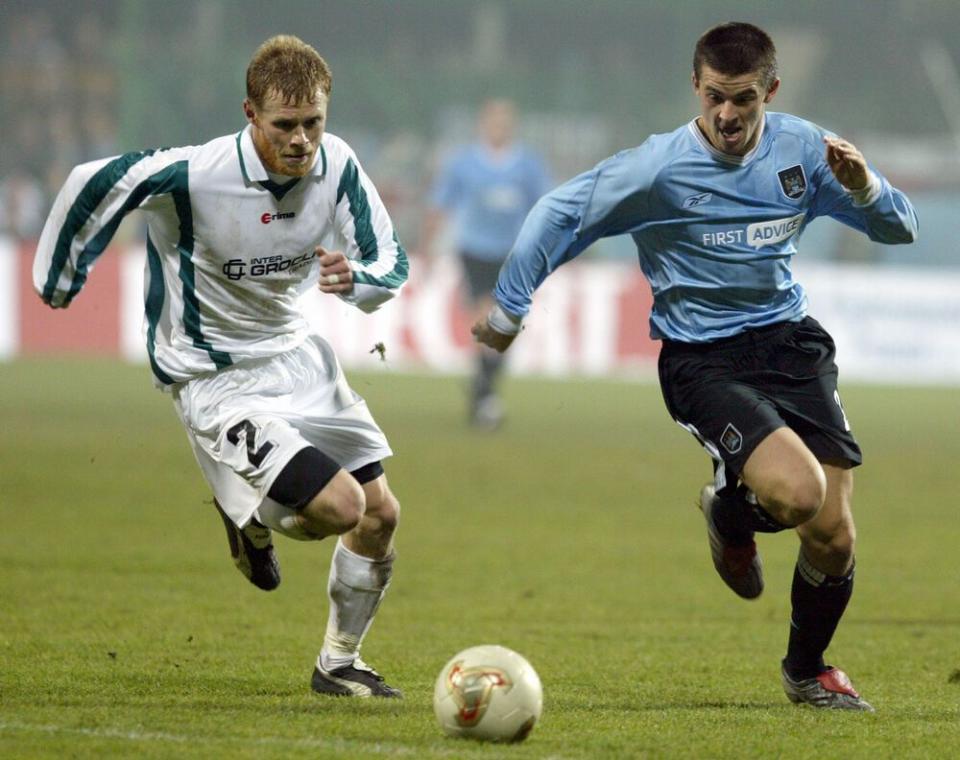
AC: So, in your life and career, how do you see the balance between your physical health and mental health?
JB: When I was younger, it was a lot more about the physical. As you get older, you understand that it’s more about the mental side, both for your body and your motivations. It’s the famous Smiths lyric, isn’t it? ‘Does the body rule the mind, or does the mind rule the body?’ I feel the mind controls the body a lot more than I used to.
AC: Define your mindset for me.
JB: Optimistic. Up until this year, I didn’t think I was capable of getting depressed. I’ve run the gamut of emotions, lots of ups and downs, but never felt I had anything to be depressed about. But last year, professionally and personally, was the most challenging – the most difficult I’ve ever had. It was the first time I had dark moments, really dark thoughts.
AC: Why was that, do you think?
JB: I had the two court cases – one football-related, one family. I’d been sacked for the first time, which I felt was unfair and unjust, and the rejection was hard to take. Then I get a job at Bristol Rovers. The club was dysfunctional, we were getting beat, the coaching methodology wasn’t working and we got relegated. I was finding it hard.
AC: It’s interesting: you said the problems were both personal and professional, but you’ve gone straight to all the football stuff, the professional.
JB: That is my personality in a way, Al. I live through the job. I don’t switch off at 5pm. I am obsessive and compulsive about what I do, so my personal and professional lives are totally entwined.
AC: When you say you felt depressed, what did that feel like?
JB: It was my lowest ebb. Bad results, the court cases… With the football one, the police were on my case over something they wouldn’t even bother with if it’d happened in the street. But it’s Joey Barton, the outlaw character, so there you go. Waste of time, waste of money. I went to court in Sheffield, was found not guilty, but by then papers like The Sun have had their fill, saying I headbutted him, kicked him round the tunnel, knocked his teeth out…
AC: What is happening on the domestic one?
JB: Again, I think me being me was the problem. We were having a row, my missus called the police, then the next day when they asked if she wanted to press charges, she said no. She said she had been drunk, should never have called, and we thought that was that. Then six weeks later the police tell us they’re charging me on the basis of what she said on the 999 call.
AC: You’re still together?
JB: Absolutely. We’re about to have another baby. Number four.
AC: When things are not good like that, personally and professionally, do the players pick up on your moods?
JB: One hundred per cent. The manager’s energy is infectious. It sets the tone and it either lifts the building or sets it down. I had days when I wasn’t even coming out of my office. I was living away from home and family, up and down to Bristol, the club’s all over the place, the team’s not responding, the fans were chucking everything at me, and I get to a point of thinking, ‘I need to get out of this.’ I can feel my mental health deteriorating. I’m waking up and not enjoying that feeling, looking in the mirror, not enjoying it, not feeling like I should. I felt I was the problem; I was the one holding things back.
Then there’s this day. We’ve had a pre-season friendly, crap game. My missus is away with the kids in Wales and I’m meant to be joining them the next day. I head home and get back at midnight. I don’t know if I told you, Al, but I got into gardening in lockdown. And I know I’m not going to sleep, so I decide to get my mining lamp and go out in the garden. It’s my pride and joy, my garden.
AC: But it’s midnight?
JB: [Laughs] I know. I remember thinking that if the neighbours see me they’re going to think I’m a crackpot. Then I’m thinking they might think it’s a burglar and they’ll call the police – and they’re the last people I want coming round. But I know I don’t want to be alone with my thoughts. I’m having these dark thoughts.
AC: Do you mean dark thoughts as in, ‘I can’t do this job,’ or dark thoughts as in, ‘I can’t see the point of being alive’?
JB: It’s more like, ‘How can I carry on? What is the point of my life? What is the point of my existence?’ For the first time in my life, the eternal optimist in me had gone. There’s all these people thinking, ‘You’re a wife beater, you’re a violent thug,’ and I know it’s not true, but I’m thinking, ‘What if Georgia’s family, or my family, see it like that? What about the teachers and the kids at the school? What are they thinking? Are they going to be saying stuff to my kids?’ When you’re infamous the way I am, you get hauled over [the coals] by the national press over stuff that’s not even been proven in a court. There’s all this media noise, then social media amplifies it. And you worry about that kind of thing.
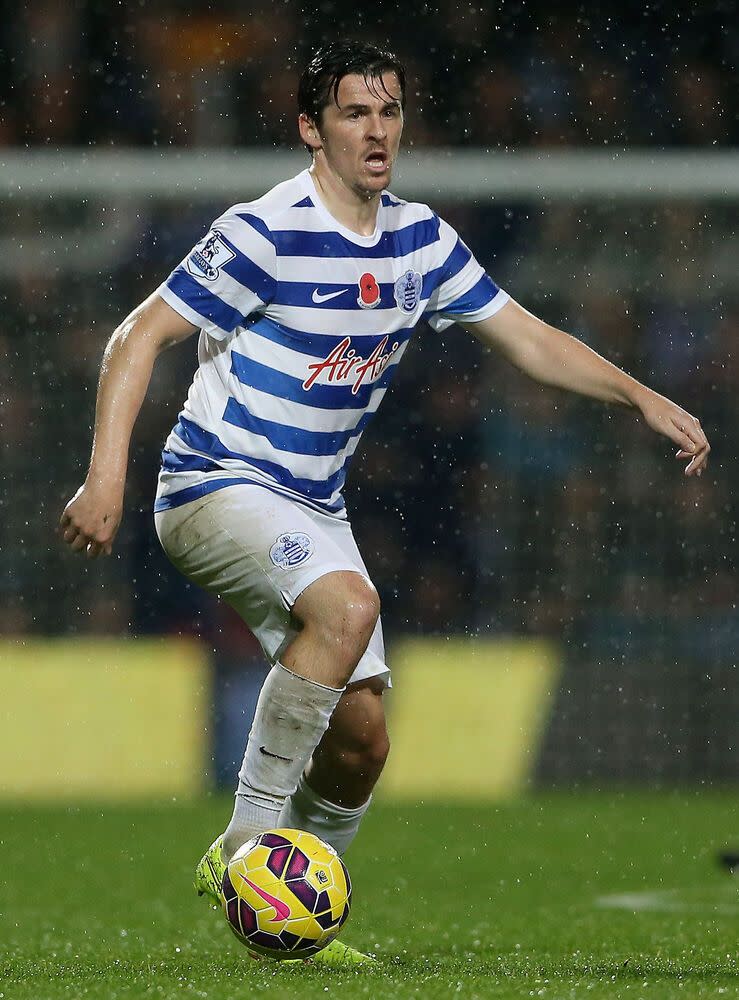
AC: How did you deal with it?
JB: I knew it wasn’t a good idea to be out there. So I came in from the garden and I had a shower. I wasn’t in a great frame of mind. I opened the window to let the steam out and I remember standing in the shower thinking, ‘All these things that have happened, when you break them down and think it through, it’s obvious… I am the problem here.’ The team is shit, but if I go, they’ll be better. As for the family, if I’m not here, all that noise and nonsense just stops. I’ve got lots of money in the bank, I leave it to them, they can get on with their lives, everyone is better off without me. It was a really tough shower [laughs].
AC: That is what happens in suicidal ideation. Whenever I have it, I always think Fiona will be better off without me.
JB: It was the first time I’d ever had that. I remember thinking about Gary Speed [former player and Wales manager who ended his own life in 2011] and wondering, ‘How does someone go from being rational and normal to ending up killing themselves?’ What happens? What is the moment when you slip over into that way of thinking and actually do it?
AC: Do you think you were feeling that no matter what you did with your life, you were always going to be seen in this negative light by so many people?
JB: It was more that I couldn’t see the logic of my own life. I wasn’t enjoying the journey. It felt like a futile existence. I’ve been in some tough spots before, such as Strangeways [HM Prison Manchester], but I’d never felt like this. Then I remember looking at the window and thinking, ‘Would the fall kill me if I jumped out?’ But I decided that it wouldn’t.
Then I’m just standing there, looking at myself in the mirror and I know things aren’t right. I walk back into the bedroom and I turn the lights out and I’m saying to myself, ‘Go to sleep,’ but then I have this overwhelming feeling, like a panic attack, that if I went to sleep I’d never wake up. I’m going to die. My missus or my kids will find me, which will be awful, and I can’t do that to them, so I decide I can’t afford to sleep.
I turn the lights on and there’s a picture of Georgia and the kids in the bedroom, and I focus on that and just say to myself, ‘This will pass.’ But I was really worried about the chain of thought – that everyone would be better off if I was not here. I keep looking at the picture and I’m saying, ‘This is not about you. Well, it is about you, but it’s not about you.’ I’m thinking, ‘How would I have felt if my dad had killed himself when I was 10?’ I’m thinking about all of those questions you’d leave behind, so I say to myself, ‘You have to battle through for your kids.’

AC: Did you talk to anyone?
JB: I did. The panic was telling me to tell someone. I know myself and I know it’s dangerous if I just internalise everything. I rang people close to me, family, and talked them through what happened. I said, ‘There’s no need to come, I just needed to tell you.’ I made a cup of tea and I turned on the telly. I think it was BBC World News. Then I must’ve fallen asleep because when I woke up, the TV was still on and the panic was gone. It went as quickly as it came. So I went to Wales to join the family. The whole thing really scared me. And if it can happen to me, it can happen to anyone. It’s why it’s important to be honest and get it all out in the open.
AC: Has it happened again since?
JB: No. First time, only time.
AC: Did you see anyone about it professionally?
JB: Sally at the LMA [League Managers’ Association]. That helped. I was very candid.
AC: And nothing like it happened in jail?
JB: No.
AC: What did you learn from your experience in jail?
JB: That when you think you’ve hit rock bottom, you haven’t. I reflected a lot and I realised it was all self-induced, all the problems I had. I also realised there were people in there who didn’t have a chance. The world really is geared against them. Our rock bottom would be paradise for them.
AC: Did it make you humble?
JB: Not humble, it got me out of my way of thinking about why I was in there.
AC: How did other prisoners deal with you?
JB: Okay. The key thing is to establish the hierarchy and work out where you sit.
AC: Where did you sit?
JB: I sat in a safe zone as much as I could. You needed to make sure people knew no one could take you on, but you’re not running any syndicates on the wing [laughs]. You keep your head down, get in and out as quick as you can and reflect on the patterns that got you there. I went in feeling very sorry for myself but that changed.
AC: Was there never a time when one of the other prisoners thought, ‘Ah, Joey Barton, I think I’ll have a go.’
JB: There were a couple of moments where people test you to see if you’re a soft touch, but most people don’t want to get too visible.
AC: Were you scared?
JB: Oh yeah, of course. You’re walking across the yard and people are shouting out the window, ‘I’m gonna slash you, I’m gonna stab you in the arse.’ I mean, it’s a bit different to being out on the pitch and having a fan shouting, ‘Hey, you’re shite.’ Then your mind starts reliving American prison movies. You think all sorts of mad stuff is going to happen. But then you realise people are people.
AC: Did you make any friends?
JB: I stay in touch with two or three who have got off the jail train, are back into civilian life and have turned things around. There are good people in there, lots of people who didn’t have a chance, didn’t have support. The gears of society have always been working against them.
AC: You were in there because of this violent streak. Where does it come from and is it still there?
JB: It comes from the environment you’re raised in. I was given a skill set to survive in the environment I was in. My dad was preparing me for a life in Knowsley and Huyton, one of the highest unemployment rates in the country. A Labour heartland that becomes austerity heartland when the Tories are in power. Your options aren’t the same as in Chelsea and Westminster, where my son was born. My dad was preparing me to live on estates and deal with the problems that arise there.
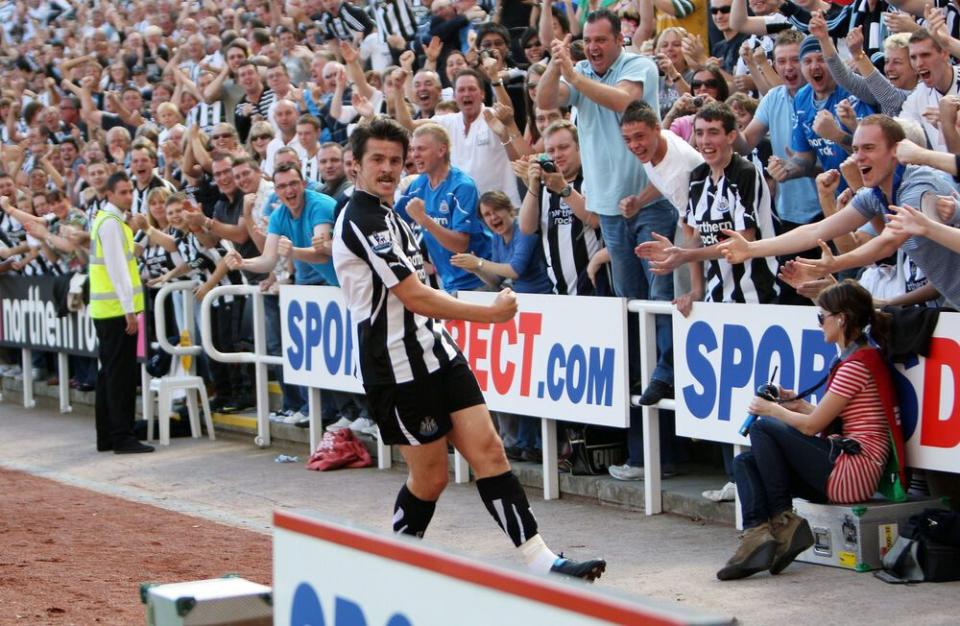
AC: These violent incidents you’ve been involved in. What happens in your head? Is it just a red mist descending?
JB: That has happened in my life, but that is not my MO. My MO is cool and calm and then go, and that’s more dangerous. That is the way I’ve dealt with it in the past and it’s wrong. Then I got involved with Sporting Chance, did anger management, got into psychology, into Jungian theory. Life is a constant process of evolution, trying to be a better version today of what you were yesterday.
AC: Do you think your players are scared of you?
JB: [Long pause] No.
AC: You sure?
JB: Absolutely. Were the players scared of me at Burnley? You know those lads, did they say they were scared of me?
AC: They knew you had a real edge.
JB: Hold on, you had an edge! Everyone was scared of you when you were with Tony [laughs].
AC: Do you think you fulfilled your full potential as a player?
JB: Depends which me you’re asking. As a 39-year-old looking back, no. As a 13-year-old desperate to be a player and everyone telling me I was too small, not good enough, then yes, I had a great career. But it could’ve been better, if I had been better behaved, if I’d stayed out of the media for the wrong reasons.
AC: Do you think that is why you only got one England cap?
JB: For sure. It had to have an effect. I was a shit- magnet when I was younger.
AC: Do you have any players who remind you of you at their age?
JB: I do, yeah.
AC: How do you deal with them?
JB: The same way I would’ve handled myself. Treat them like men, with respect, but have the difficult conversations when you need to. Tell them to stop being such a cunt. With all the experience of my own difficulties, I can sit and talk to players about the pitfalls of everything they might meet. And I expect people in my coaching group to say that to me, to tell me not to be a cunt if I’m getting out of kilter. We all get out of kilter at times.
As a player, I was on a hero’s journey. I felt accountable only for myself. I made money, did okay. But now I want to go on a better journey, and that means not messing about. If I let myself down now, I also let down friends, colleagues, the team and all their families. I can’t go out and have a violent episode because the consequences aren’t just for me.
AC: Do you have control over that, though?
JB: Do we ever have total control?
AC: If you think of some of the major incidents in the past, if you imagine those exact same situations and people, would you react differently?
JB: Well, I hope not to put myself in a city centre at 2am, with 20 pints and a few chasers in me, with my top off and twirling it above my head, because I’m thinking this is a great pressure valve and no one knows who I am. Because they do, of course they do. A lot of lads are jealous of footballers, so some might take a pop. And one thing my father taught me is you never take a backward step.
AC: Could you take one today, though?
JB: I have learned that I am a general, not a soldier, and generals are more important than soldiers. If I am a soldier, I get killed more quickly, because I walk towards danger, not away from it.
AC: Do you think you will have a big career in management?
JB: I always knew I would do this. Same as I always knew I would be a player. If I’d listened to everyone else, I would never have done it. I proved myself right and a lot of people wrong. And I’ve always known I would be a better coach and manager than I was a player. Those two things ran in my head simultaneously. I knew I would be a coach and manager, and that I would be good.
AC: So are you saying the ultimate goal is to be up there with Klopp and Guardiola, Fergie and Wenger?
JB: I don’t know, that’s a long way off. But I wouldn’t go down this vocation if I didn’t think I could be the apex predator. There is no point doing it if you can’t become the best. For me, I am fortunate in terms of my career path as a player. But the coaching and people-development aspects really interest me. It’s where I can be more beneficial to the human spirit, and to a community. I mean, I know I can’t be Prime Minister…
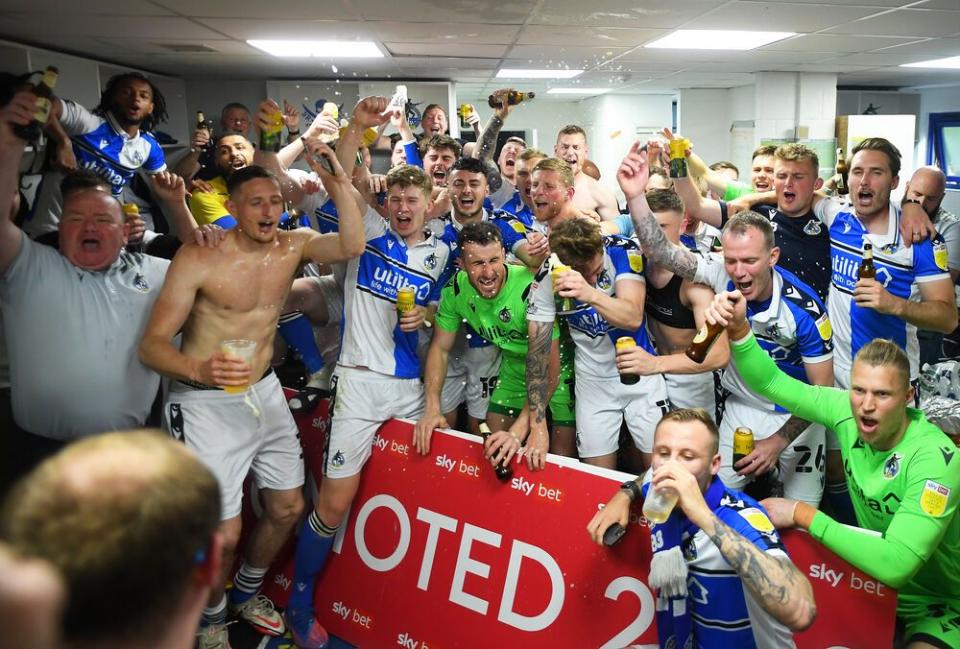
AC: You’d be better than Boris Johnson was.
JB: That’s really not much of a compliment, Al. The lampshade behind you would be a better Prime Minister than him. But I know I can’t get there because of my career and the scrapes and the way I’ve gone through life. I thought I was superb on Question Time, apart from the thing I said about an ugly woman, which was taken right out of context. [Appearing on Question Time in 2014, Barton said the options available to the electorate at the polls were like choosing, ‘Between four really ugly girls.’] But afterwards, I thought to myself, ‘Why would anyone want to do that all the time? Why would anyone want to be a politician?’
AC: Where are you on the political spectrum at the moment?
JB: I’m not on it at all right now. I feel that disenchanted. The country is so chaotic it’s ridiculous. If a Prime Minister can’t be trusted to tell the truth, what chance have we got? So I’m focusing on Bristol Rovers at the minute and when the elections come about, I will wire back into it again.
I do love the podcast you and Rory Stewart are doing, mind you. I think it’s a bit of light in the darkness. I’ve been listening regularly and it’s more positive than all the negative energy you see in most of politics. Rory knows some of the friends I have in the military and they told me he was okay. I said, ‘No, I’m not having him!’ But he’s grown on me a lot.
I think I can do social change in Bristol through football. Look at what Bill Shankly did for Liverpool, and now Jürgen Klopp. Or [former manager Sean Dyche] Dychey for Burnley. I can’t be MP for Burnley or Bristol, but I can make a real difference. The bigger the resources, the more that can happen. If you get to be England manager, and do it well, that’s got to be up there with being Prime Minister, in a way. The trouble is the FA still see me as an outlaw.
AC: So in your head you could see yourself doing the job?
JB: If I fulfil my potential as a manager, why shouldn’t I be the apex predator?
AC: What’s with this apex predator thing?
JB: It’s the hierarchy of chimpanzees. Race to the top. In my game, it’s kill or be killed.
AC: Let’s go back through your playing career. Give me a snapshot of every professional club you played for.
JB: Started at Man City, Kevin Keegan in charge, not the Man City we know today, the superclub with all the oil money. But they gave me my chance and I loved every moment. I have a bit of a love-hate relationship with the fans – I love them, some of them hate me – but it’s a great club. Then Newcastle, magnificent club, great fans, great people. The Shepherds sold out to Mike Ashley, we managed to get them back to the Premier League, I had some great spells, then fell out with Ashley and left. QPR, to be honest, that was mainly for finance, it was too good to turn down, but I had a tough time there. Then Marseille, that’s where I was when we really got to know each other, and I absolutely loved it. I would love to go back there as a manager, I had an amazing rapport with the fans. Then back to QPR and we had a play-off final, which was great, so level par in a way. Then Burnley, where I had a phenomenal spell – absolutely, totally loved it.
AC: The feeling was mutual.
JB: I know, and that was interesting because I had a bit of previous with Burnley. But it was a great fit. Great relationship with the fans. I felt apex predator in there, driving the team and even the naysayers came round. Then Rangers, which could’ve been great. But the club and the manager weren’t ready and it all blew up in my face. Then Dychey took me back, another great spell, and then the FA banned me for betting and it was over. It means my very last playing memory was chasing Anthony Martial.
AC: Home against United?
JB: Yeah. He gets into our half and I think I can chase him rather than bring him down, but he gets away and passes to Rooney, who scores. Afterwards Dychey says, ‘Why didn’t you trip him?’ And I said, ‘I thought I could catch him.’ ‘You’re joking!’ he says. ‘Martial? You?’ [Laughs]. Anyway, it means my first game was for City at Bolton in the Premier League and my last game was for Burnley against Man United in the Premier League. I came in at the top and I went out at the top.
AC: You mentioned your addictive personality. Are the addictions under control?
JB: They are, but I have to work hard at it. The wife and the kids are brilliant in that, so important, because they give me this balance. When I first fell in with Peter Kay [co-founder] at Sporting Chance, I didn’t want to get married or have kids. I was low on empathy, selfish. But he helped change that. Then I met my wife and she has been the greatest gift I ever had. And then the kids after that. It all takes you out of yourself. Nature, too, and the garden. I see you on social media with your tree pictures, and I’m like that with flowers, always taking pictures of trees.
AC: Oh, come on, Joey! I’ve got my Tree of the Day on Twitter and Instagram. It’s time for Joey Barton’s Flower of the Day. It’s got to be.
JB: Yeah – and watch the obscenities come back. ‘Flowers! Fuck off, Barton!’ I’m off social media at the moment. The negativity is toxic. I don’t know how you put up with it, all the abuse on there.
AC: I don’t let it get to me.
JB: You’re a better man than me, then. For me, it’s impossible. If someone gets after me, I have to engage. So I’ve taken myself out of it.
This interview appears in the September 2022 issue of Men's Health.
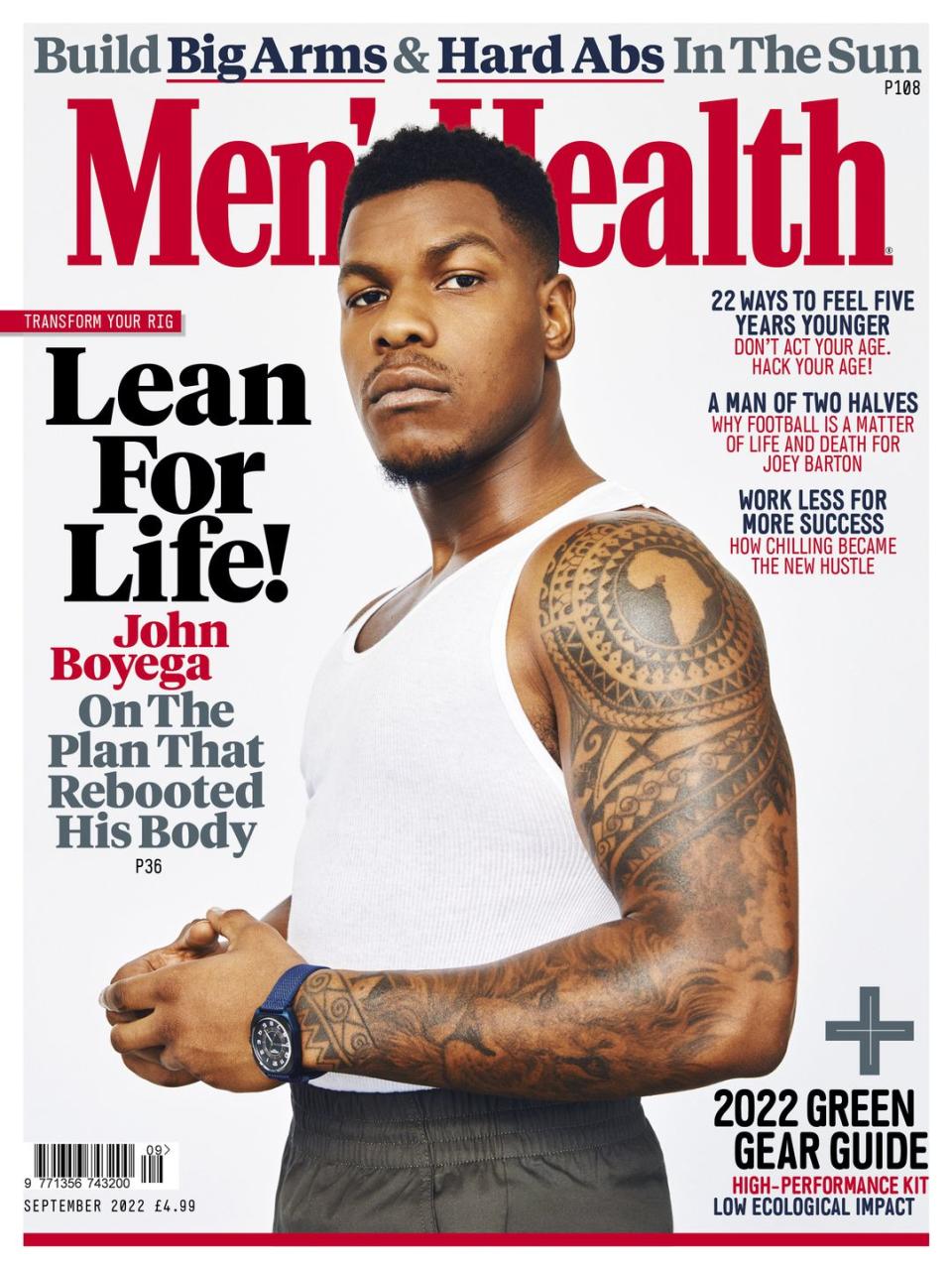
You Might Also Like

 Yahoo Sport
Yahoo Sport 





































